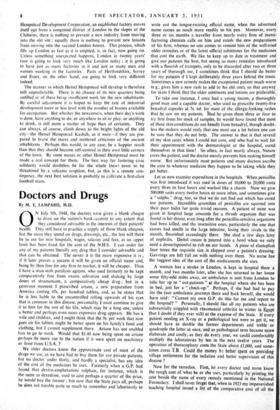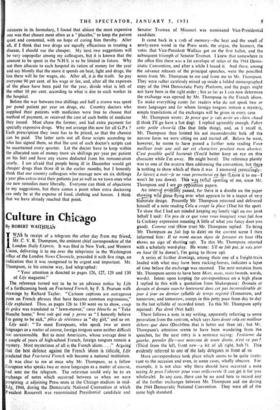Doctors and Drugs
By M. E. IAMPARD, M.D.
N July 5th, 1948, the doctors were given a blank cheque to draw on the nation's bank-4ccount to any extent that they considered advisable in the interests of their patients' health. They still have in practice a supply of those blank cheques, but the more they spend on drugs, dressings, etc., the less will there be to use for new hospitals, wages, salaries and fees, as an upper limit has been fixed for the cost of the N.H.S. I can order for any of my patients literally any drug that I consider advisable and that can be obtained. The newer it is the more expensive it is ; if it later proves a success it will be given an official' name and, being by then free for any film to market, it will be cheaper. Thus have a man with paralysis agitans, who used formerly to be kept comparatively free from excess salivation and shaking by large doses of stramonium, a comparatively cheap drug ; but in a generous moment I prescribed artane, a new preparation from America costing 45s. per hundred tablets, and, as he states that he is less liable to the uncontrolled rolling upwards of his eyes that is common in this disease, presumably I must continue to give it to him for the rest of his life, which may be a long one, unless a better and perhaps even more expensive drug appears. He has a wife and children, and I might think that the 9s. per week that now goes on his tablets might be better spent on his family's food and clothing, but I cannot supplement those. Artane has not enabled him to go to work. Would that $1.40 now being spent on artane perhaps be more use to the nation if it were spent on machinery or food from U.S.A. ?
We older doctors know the approximate cost of most of the drugs we use, as we have had to buy them for our private patients, but no doctor under thirty, and hardly a specialist, has any idea of the cost of the medicines he uses. Formerly when a G.P. had found that dextro-amphetamine sulphate, for instance, which is the same as dexedrine, used to cost perhaps a quarter of the price, he would buy the former ; but now that the State pays all, perhaps he does not trouble Quite so much to remember and laboriously to write out the tongue-twisting official name, when the advertised name comes so much more readily to his pen. Moreover, every three or six months a traveller from nearly every firm of manu- facturing chemists calls on him and extols the new preparations of his firm, whereas no one comes to remind him of the well-tried older remedies or of the latest official substitutes for the medicines that cost the earth. We like to keep up to date in treatment and give our patients the best, but seeing so many remedies introduced with a flourish of trumpets, only to be discarded after two or three years of thorough use, I sometimes think that I should do better for my patients if I kept deliberately three years behind the times. Sometimes a new remedy makes the exceptional patient much worse (e.g., gives him a new rash to add to his old one), so that anyway,. for skins I think that the older ointments and lotions are preferable..
To take one instance, I once had a young locum, a thoroughly good man and a capable doctor, who used to prescribe twenty-five benadryl capsules at 7s. 6d. for most of the allergic-looking rashes that he saw on my patients. 1-lad he given them three or four to try first from his stock of samples, he would have found that most of these skin conditions do not benefit from benadryl, though doubt- less the makers would reply that one must use a lot before one can be sure that they do not help. The answer to that is that several of my skin cases whom I could not cure, and who had to wait for their appointment with the dermatologist at the hospital, cured themselves in that time! So often, in fact nearly always, Nature cures the patient, and the doctor merely prevents him making himself worse. But unfortunately most patients and many doctors ascribe the cure to whatever medicine they happen to be taking while they get better.
Let us now examine expenditure in the hospitals. When penicillin was first introduced it was used in doses of 10,000 to 20,000 Units every three to four hours and worked like a charm. Now we give 500,000 units every twelve hours or more often, and sometimes give a " sulpha " drug, too, so that we do not find out which has cured our patients. Incredible quantities of penicillin are squirted into their poor hides for quite trivial reasons. A patient of mine was given in hospital large amounts for a thrush organism that was found in her throat, even long after the penicillin-sensitive organisms had been killed, and the insensitive ones, particularly the one that causes bad smells in the large intestine, losing their rivals in the mouth, flourished exceedingly there. She died a few days later of nephritis. Dettol cream is poured into a bowl when we only need a dessertspoonful to rub on our hands. A piece of elastoplast four times the requisite size is clapped over a patient's dressing. Gas-rings are left full on with nothing over them. No nurse has the foggiest idea of the cost of the medicaments she uses.
A woman has a stroke in London, is kept in hospital there a month, and two months later, after she has returned to her home some fifty-odd miles away, an ambulance is sent from London to take her up to " out-patients " at the hospital where she has been in bed, just for a " check-up." Perhaps, if she had had to pay for the four ambulance journeys there and back herself, she would have said: "Cannot my own G.P. do this for me and report to the hospital? " Personally, I should like all my patients who are substantially crippled with rheumatoid arthritis to winter in Egypt (but I doubt if they ever will) at the expense of the State. If every patient needing an X-ray or a pathological test were to get it, we should have to double the former departments and treble or quadruple the latter at once, and as pathological tests became more elaborate and costly, as they do every year, we could comfortably multiply the laboratories by ten in the next twelve years. The operation of thoracoplasty costs the State about £1,000, and some- times cures T.B. Could the money ba better spent on providing village settlements for the isolation and better supervision of this disease ?
Now for the remedies. First, let every doctor and nurse know the rough cost of what he or she uses, particularly by printing the cost beside the name of every remedy mentioned in the National Formulary. I shall never forget that, when in 1923 my impoverished teaching hospital issued a list of the comparative cost of all the mixtures in its formulary, I found that almost the most expensive one was that chosen most often as a " placebo," to keep the patient
quiet and contented, with no hope of curing him thereby. After all, if I think that two drugs are equally efficacious in treating a disease, I should use the cheaper. My next two suggestions will be very unpopular among my colleagues, but it is known that the amount to be spent in the N.H.S. is to be 'limited in future. Why not then allocate to each hospital its ration of money for the year and say bluntly that the more it spends on heat, light and drugs, the less there will be for wages, etc. After all, it is the truth. So pay everyone 90 per cent. of his wage or fee, and, after all the expenses of the place have been paid for the year, divide what is left of the other 10 per cent. according to what is due to each worker in the hospital.
Before the war between two shillings and half a crown was spent per panel patient per year on drugs, etc. Country doctors who supplied their patients with medicines were free to choose that method of payment, or received the cost of each bottle of medicine they issued. Most chose the former, and had extra payment for specially expensive drugs. Why not arrange this now for all G.P.s ? Each prescription they issue has to be priced, so that the chemist can be paid. The latter sorts out all these scripts according to who has signed them, so that the cost of each doctor's scripts can be ascertained every quarter. Let the doctor have to keep within the allocated sum of money (now six shillings per year per patient on his list) and have any excess deducted from his remuneration yearly. I am afraid that people being ill in December would get cheaper drugs than those ill in the earlier months, but I honestly think that our country colleagues who manage now on six shillings a year plus extras treat their patients just as well as we town ones who use new remedies more liberally. Everyone can think of objections to my suggestions, but there comes a point when extra doctoring can only be at the expense of food, clothing and houses. I think that we have already reached that point.







































 Previous page
Previous page